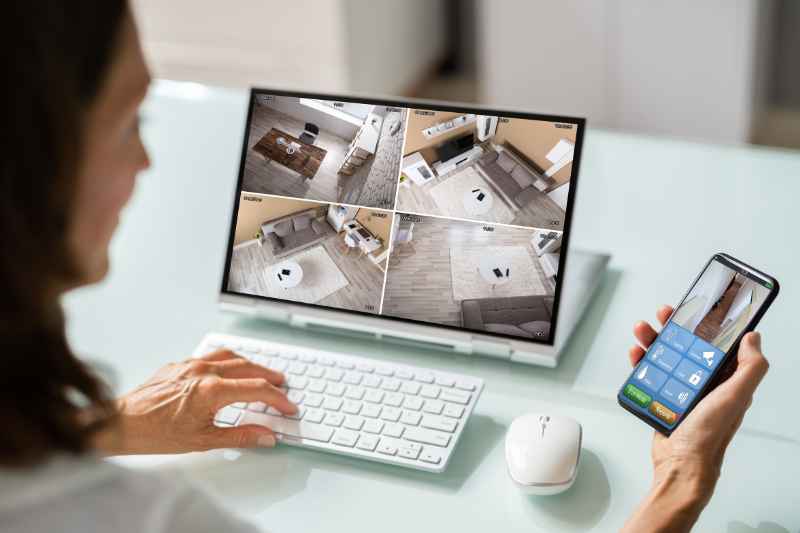Key takeaways
- DVR systems are analog camera systems that use old-school cameras and wiring. On the other hand, NVR systems use the latest internet-based technology and provide more features.
- If you’re deciding on an NVR vs. DVR system, choose based on factors like cost considerations and ease of installation. However, keep in mind that NVR systems are easier to integrate into other security systems, and they have higher, cloud-based storage capabilities.

When setting up a security system for your home or business, one of the key decisions you’ll face is whether to choose a DVR (Digital Video Recorder) video management system or an NVR (Network Video Recorder).
While both DVR and NVR systems are designed to record and manage video footage from security cameras, they operate differently and have distinct advantages and disadvantages. Understanding these differences is crucial for making an informed decision that best suits your security needs. In this post, we’ll compare DVR and NVR systems and help you choose the best fit for your property.
This post covers:
- What is a DVR system?
- What is an NVR camera?
- NVR vs. DVR pros and cons
- Choosing between NVR vs. DVR
- The best security camera system
What is a DVR system?
A DVR, or Digital Video Recorder, is a traditional technology used in security systems. DVR systems rely on analog cameras and coaxial cables to capture and transmit video footage. The DVR unit processes and records the video signals received from the cameras.
DVR systems have been around for many years and are known for their reliability and lower cost compared to newer technologies.
Key features of DVR systems are:
- Analog cameras. DVR systems use traditional CCTV cameras.
- Coaxial cabling. These heavy-duty cables transmit power and carry video signals.
- AD encoder. The analog-digital encoder processes video data and allows you to store it in a digital format.
What is an NVR camera?
An NVR, or Network Video Recorder, is a more modern technology that works with IP (Internet Protocol) cameras.
NVR systems use Ethernet cables to connect cameras to the network, allowing for digital video processing at the camera level before transmission to the recorder. This results in higher video quality and greater flexibility in system setup.
Key features of NVR CCTV systems include:
- IP cameras. NVR cameras utilize digital technology.
- Ethernet cables. Handles data transmission and power.
- Network-based. Processes video data at the camera level.
Watch how ButterflyMX works:
What are the 2 types of NVR?
The two types of NVR cameras are wireless and PoE cameras.
PoE cameras use special wiring that allows them to transmit power and ethernet over the same cable.
On the other hand, a wireless NVR camera might run on batteries that allow you to forgo installing wiring entirely. They’re easier to install, but the wiring that a PoE camera uses guarantees the connection’s stability.
NVR vs. DVR pros and cons
We’ll help you decide which system you should invest in by outlining the pros and cons of each type of camera.
DVR system pros
- Cost-effective. Analog cameras are generally less expensive than IP cameras.
- Simplicity. Easy to understand and install for those familiar with traditional security systems.
- Works with existing infrastructure. Can often use existing coaxial cabling, which can be cost-effective if upgrading from an older system.
- Lower initial cost. DVR systems are generally cheaper than NVR systems due to the use of analog cameras and simpler technology.
- Straightforward setup. Well-suited for simpler installations with fewer cameras.
- Improved resolution. Recent advancements have improved the resolution of analog cameras, narrowing the gap with digital systems.
DVR system cons
- Limited flexibility. Cannot mix and match different types of cameras.
- Lower image quality. Analog cameras typically offer lower resolution compared to IP cameras.
- Installation challenges. Coaxial cables are bulkier and more rigid, making installation more cumbersome in tight spaces.
- Power requirements. Requires separate power cables for each camera, which can complicate setup.
- Limited features. Security DVR recorders process and record video data, but they don’t support modern features like remote viewing and advanced analytics, nor do they support NVR systems.
- Less versatile. Limited to wired camera setups and cannot easily accommodate wireless cameras or integrate with other modern security technologies.
- Lower resolution. Generally provides lower video quality compared to IP cameras used in NVR systems.
NVR system pros
- Higher resolution. IP cameras offer superior image quality, with higher resolutions and better detail.
- Advanced features. IP cameras often include features like audio recording, motion detection, and facial recognition.
- Simplified setup. Ethernet cables can carry both data and power through Power over Ethernet (PoE), reducing the need for separate power cables.
- Easier installation. Thinner and more flexible than coaxial cables, making installation in tight spaces easier.
- Digital processing. Video data is processed at the camera, leading to higher-quality recordings.
- Remote access. Easier to set up remote access and integration with other networked devices.
- Greater flexibility. Can integrate both wired and wireless cameras, offering more options for installation.
- Scalable. Easier to expand and integrate with other networked systems.
- Superior quality. Digital processing and higher resolution capabilities result in clearer, more detailed footage.
NVR system cons
- Higher bandwidth requirements. Digital video can require more network bandwidth and storage space.
- Complexity. May require a more complex setup and network configuration compared to DVR systems.
- Higher costs. The advanced technology and features of NVR systems come with a higher price tag. Additionally, IP cameras are more expensive than analog cameras, increasing the overall cost of an NVR system.
- Distance limitations. Ethernet cables have a maximum length of about 328 feet, though network switches can extend the range.
What is the difference between NVR and DVR?
An NVR system uses the latest technological innovations, like internet-based storage and video transmission. DVR cameras depend on older, analog technology and don’t offer as many features.
Choosing NVR vs. DVR
Network video recorder vs. digital video recorder factors include:
Cost considerations
DVR systems are generally more affordable upfront due to the lower cost of analog cameras and simpler technology. However, NVR systems offer more advanced features and higher image quality, which may justify the higher initial investment for those requiring a more robust security solution.
Ease of installation
DVR systems can be more straightforward to install if using existing coaxial cabling. However, their bulkier cables and separate power requirements can make installation more cumbersome.
NVR systems, with their use of Ethernet cables and PoE, tend to offer a cleaner and more flexible installation, though they may require a more sophisticated network setup.
Scalability and future-proofing
NVR systems are generally more scalable and future-proof due to their ability to integrate with other networked devices and support both wired and wireless cameras.
DVR systems, while reliable, can be less flexible and may not accommodate future upgrades as easily.
The best security camera system
Whether you want to emphasize security, convenience, or features, the best security camera system is ButterflyMX.
ButterflyMX’s Security Cameras have features like:
- Multiple camera options. Choose between our Dome and Bullet Cameras to gain greater insights into how your property operates no matter the area, from lobbies and hallways to garages and parking lots.
- Cloud-based administration. Store video footage on the cloud and access it from any device. Plus, manage and view live camera feeds from the powerful ButterflyMX OS.
- Camera integrations. Our cameras are built to the ONVIF standard, allowing you to use our dashboard to manage many other kinds of cameras from major manufacturers. Easily manage your existing security cameras with our system for an easier management process.
- Access control integrations. Use our Cameras alongside our other access control hardware offerings, like Video Intercoms, Elevator Controls, Vehicle Access Control, and Keypads, to extend convenient access throughout your entire property.






